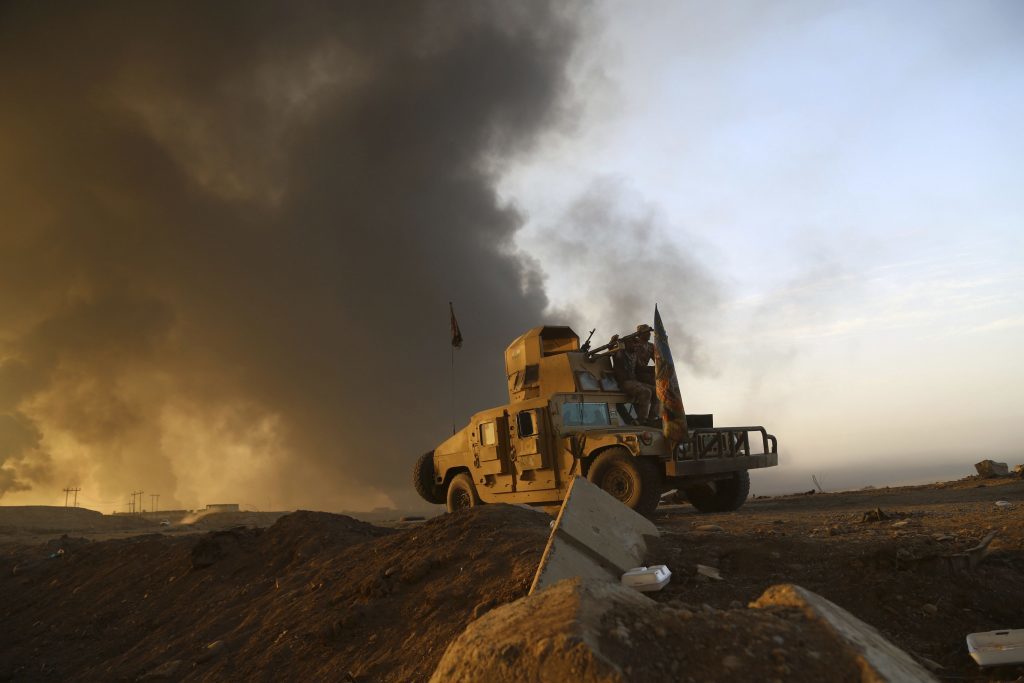
The US Pentagon is declined to blame the Iraqi government for the violence in Kirkuk and instead is urging the central government in Baghdad and the Kurdish authorities to negotiate their differences.
A Pentagon spokesman, Colonel Rob Manning, says the confrontation underway in the Iraqi city is a “distractor” to the US goal of destroying the Islamic State group, and that Iraqi security forces and Kurdish peshmerga troops should not be “going at each other”.
Asked about US Senator John McCain’s statement that the Iraqi government faces severe consequences for what he called its misuse of US military equipment to attack Kurdish forces, Manning said he could not comment beyond saying Washington wants both sides to engage in dialogue. He said US commanders in Iraq are trying to help mediate.
Two weeks after fighting together against the Islamic State group, Iraqi forces pushed their Kurdish allies out of the disputed city of Kirkuk on Monday, seizing oil fields and other facilities amid soaring tensions over last month’s Kurdish vote for independence.
The move by the Iraqi military and its allied militias so soon after neutralising the Islamic State group in northern Iraq hinted at a country that could once again turn on itself after disposing of a common enemy.
Civilians and federal troops pulled down Kurdish flags around the city. Kurdish Governor Najmaddin Karim, who had stayed at his post despite being dismissed by Baghdad weeks ago, fled to Irbil, the capital of Iraq’s autonomous Kurdish zone.
Revellers waving Iraq’s national flag and the flag of its Turkmen minority flooded central Kirkuk in an evening celebration.
But the Shiite sectarian chants heard above the din of the rally underscored the coming political battles between Iraq and its Kurdish region.
Iraqi forces were supported – as they always are now in major operations – by the Popular Mobilisation Forces, a predominantly Shiite militia coalition that the Kurds see as an instrument of Iranian policy.
In their bid to keep Kirkuk and its oil-rich countryside, Kurdish leaders whipped up fears that the Baghdad government is dominated by Tehran and would oppress Kurds if they recaptured the city.
Their fears were further affirmed after Iran came out forcefully against the Kurdish region’s nonbinding referendum for independence on September 25 and then closed its official crossings to the region on Sunday.
Iraq’s Kurds, too, remember the brutal campaigns waged by Saddam Hussein, himself an enemy of Tehran, against the minority, including a poison gas attack on the town of Halabja in 1988 that killed thousands.
As Arab and Turkmen revelers celebrated the change of power in Kirkuk, thousands of Kurdish residents, fearful of federal and militia rule, packed the roads north to Irbil.
But Baghdad was eyeing its Kurdish partners warily as well. Prime Minister Haidar al-Abadi said he was reclaiming a city that never was part of the Kurdish autonomous region.
When Iraq’s armed forces crumbled in the face of an advance by Islamic State group in 2014, Kurdish forces moved into Kirkuk to secure the city and its surrounding oil wells. The city is 20 miles outside the Kurds’ autonomous region in northeast Iraq.
Baghdad insisted the city and its province be returned, but matters came to a head when the Kurdish authorities expanded their referendum to include Kirkuk. To the Iraqi central government, that looked like Kurdish expansionism. The city of more than one million is home to Arabs, Kurds and Turkmen, as well as Christians and Sunni and Shiite Muslims.
Kurdish officials accused the Iraqi army of carrying out a “major, multiprong attack,” and reported heavy clashes on Kirkuk’s outskirts, but a spokesman for Iraq’s state-backed militias said they met little resistance.
By midday, federal forces had moved into several major oil fields north of the city, as well as its airport and an important military base, according to Iraqi commanders. Kurdish party headquarters inside Kirkuk had been abandoned.
The US, which has armed, trained and provided vital air support to both sides in their shared struggle against the Islamic State group, described Monday’s events as “coordinated movements, not attacks,” while bemoaning the dispute as a distraction against a common enemy. It said the limited exchange of fire was a “misunderstanding”.